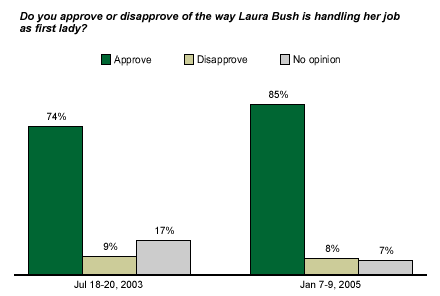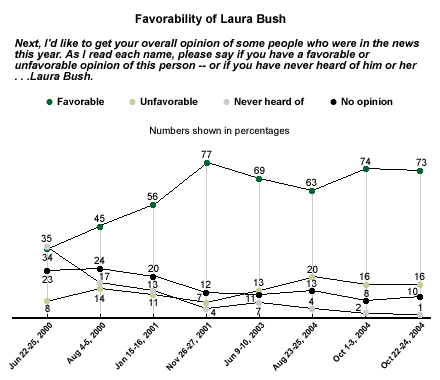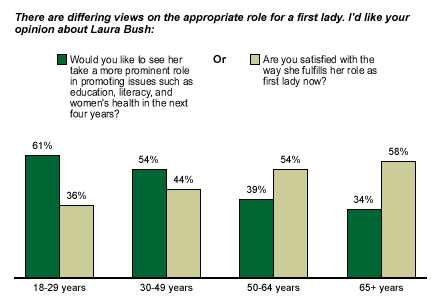The Constitution clearly defines the expectations and roles of the president, but not so for another important White House occupant -- the first lady. As such, it's largely up to the first lady to find or create her own niche. A recent Â鶹´«Ã½AV Poll* assessed public opinion of the job current first lady Laura Bush is doing, and whether she should play a more prominent role as her husband begins his second term in office.
Laura Bush's Job Approval Rating
Eighty-five percent of Americans approve of the job Laura Bush is doing as first lady, while just 8% disapprove. The percentage of Americans saying they approve has increased significantly since Â鶹´«Ã½AV first asked the question in July 2003, with most of the increase coming from a decrease in the percentage of those who had no opinion on her job performance.

Unlike her predecessor Hillary Clinton, Laura Bush has generally stayed out of the political arena during her tenure as first lady. Thus, it's not surprising that her popularity generally holds up across party lines. Nearly all Republicans approve of the way she's handling her job (96%), as do more than 8 in 10 political independents (82%). A solid majority of Democrats (76%) also approve of the way Laura Bush handles her job.
Generally speaking, the public likes Laura Bush, too. In October 2004**, an average of nearly three-fourths of Americans (74%) expressed a favorable opinion of her, while just 16% said they think of her unfavorably. The first lady has maintained a majority-positive favorability rating since her husband took office in January 2001.

Should the First Lady Be More Prominent?
Like first ladies before her, Laura Bush has used her position to talk about certain causes, including education, women's health issues, and literacy. Â鶹´«Ã½AV asked Americans if they would like Laura Bush to more prominently promote the issues she cares about. Here Americans are split: 48% say they would like to see the first lady take a more prominent role with issues such as education, literacy, and women's health in the next four years; a similar percentage -- 47% -- are satisfied with the way she fulfills her current role.
Age is the biggest variable when it comes to opinion on the first lady's role. Younger Americans (18- to 29-year-olds and 30- to 49-year-olds) are more likely to say they'd like Laura Bush to take a more prominent role, while those over 50 are less likely to say the same.

Perhaps not surprisingly, women are more likely than men to say that the first lady should try to be more prominent, 52% of women say this compared with 43% of men. Also, 59% of Democrats, but only 35% of Republicans, would like Laura Bush to take a more prominent role in promoting education, literacy, and women's issues -- issues often associated with Democrats.
*These results are based on telephone interviews with a randomly selected national sample of 1,008 adults, aged 18 and older, conducted Jan. 7-9, 2005. For results based on this sample, one can say with 95% confidence that the maximum error attributable to sampling and other random effects is ±3 percentage points. In addition to sampling error, question wording and practical difficulties in conducting surveys can introduce error or bias into the findings of public opinion polls.
**Results are based on telephone interviews with 1,538 national adults, aged 18 and older, conducted Oct. 22-24, 2004. For results based on the total sample of national adults, one can say with 95% confidence that the margin of sampling error is ±3 percentage points.
